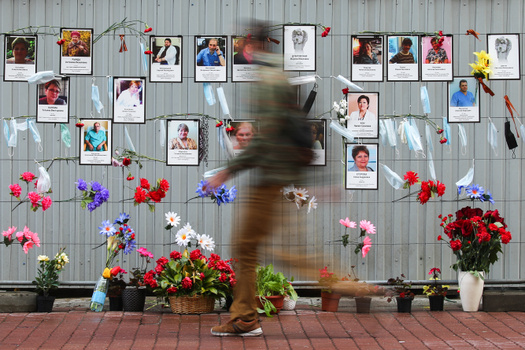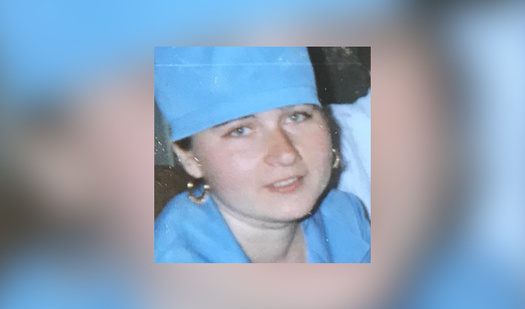
‘Mama, this is a terrible disease’ In St. Petersburg, more than 3,000 medical workers have contracted COVID-19. Here’s one of their stories.
Мы рассказываем честно не только про войну. Скачайте приложение.
According to official data alone, more than 3,000 medical workers in St. Petersburg have fallen ill with the coronavirus — that’s about 20 percent of the total number of COVID-19 cases in the city. In addition to the increasing number of doctors contracting the disease, the general outbreak in St. Petersburg isn’t getting any better: between 350–390 new cases are registered daily, and this number isn’t going down. To illustrate how the pandemic is impacting St. Petersburg’s medical workers and their families, Meduza tells the story of Olga Novikova, who worked as nurse at St. Petersburg’s Dzhanelidze First Aid Research Institute. She died of the coronavirus on May 2nd — she was only 46 years old.
We are only taking the dying
Even as a schoolgirl, Olga Novikova knew she wanted to be a nurse — she believed that this would be the best way to help people as much as possible. Her mother Lyudmila, who spent most of her life working in meteorology, thought a medical profession would be too hard on her daughter and was against the idea. She decided to change Olga’s mind, and with the help of friends, arranged for her daughter — who was in eighth grade at the time — to work as an orderly in the surgical department of a local hospital. Lyudmila was sure that this placement would “discourage any desire to become a nurse.” But this only confirmed Olga’s decision — she told her mother that she would definitely be a nurse someday.
On April 20, 2020, Novikova came home after the end of a shift at the trauma department of St. Petersburg’s Dzhanelidze First Aid Research Institute, where she had spent her entire career. This research institute is one of the largest medical institutions in Russia; it employs more than 2,000 healthcare workers. In 2019, the institute’s emergency department took in more than 78,000 people. During the pandemic, it was not converted into a coronavirus hospital, but continued to work with patients in need of emergency care instead.
Olga Novikova’s colleagues told Meduza that from the very beginning of the pandemic she was afraid of catching the coronavirus — a few years ago she contracted hepatitis. Nevertheless, she didn’t refuse shifts — Olga believed this was something that can’t be done during an epidemic. According to her co-workers, Olga was “married to her work.” “At the [Dzhanelidze Institute], the majority of the staff are crazy, in a good way. We are ready to work almost constantly, but Novikova stood out, even among us,” says one of her colleagues. Olga never married, she lived with her mother, her younger sister Nadezhda, and her sister’s son, Nikita. She spent her free time visiting the exhibitions of little-known artists.

That day, Novikova brought a thermometer home — she had had a slight temperature for a few days, but continued to go to work due to staffing shortages. Now her temperature had spiked: the thermometer showed 102.2 degrees Fahrenheit (39 degrees Celsius). Olga called in to work and asked to take a couple days off: “I’ll get [my] temperature down and come in,” she said.
Olga’s 71-year-old mother tried to convince her daughter to call a doctor, since several employees at the Dzhanelidze Institute had fallen ill already. According to official data alone, more than a hundred of the hospital’s employees had contracted the coronavirus due to shortages of personal protective equipment (PPE). Even Novikova had complained about the lack of PPE. Lyudmila had asked her daughter to bring home a couple masks at least (at that time there were none available at local pharmacies) — Olga replied that they didn’t have enough even at the hospital: “There is simply nothing to work with.”
Lyudmila tried to call a doctor for her daughter, but she couldn’t get through to the clinic. On the fifth day of Olga’s illness — at which point she had been running a temperature the entire time, and couldn’t eat or drink due to nausea, — Lyudmila called an ambulance.
In conversation with Meduza, Lyudmila Novikova recalls that an ambulance came, but the paramedics said that they are only taking “the dying,” since the hospitals were overcrowded. In response, Ogla Novikova said that she was dying. She was taken to Alexandrovskaya Hospital, where she was diagnosed with both the coronavirus and pneumonia.
In the initial days of her hospitalization, Olga spoke with her mother over the phone. During their last conversation she said: “Mama, hospitalize yourself, urgently, promise me. This is a terrible disease.” At that time, Lyudmila Novikova was already running a temperature.
After this conversation Olga’s condition worsened, she was moved to intensive care. On May 2 — her sister’s birthday — she passed away. She was 46 years old. Olga’s name appeared on the “Memory List” (a registry of medical workers who have died during the pandemic, compiled by their colleagues), as well as on the city’s accompanying memorial wall (a spontaneous monument started by St. Petersburg activist Irina Maslova).
“If Olechka had been admitted earlier, then I think they could have saved her. But nothing happened,” Lyudmila says.
Avoiding ‘Lenexpo’
Lyudmila Novikova listened to her daughter and called a doctor. On April 27, she was admitted to a veterans’ hospital with pneumonia. At this point she did her first of eight coronavirus tests — she never found out any of the results.
For the first week Novikova lay in an ordinary ward, then she began to have difficulty breathing and was moved to intensive care. “There they gave me oxygen, but I could still breathe a little bit on my own, they brought those who couldn’t breathe at all [to the ICU]. On the third day in intensive care my temperature dropped, and by the sixth day I left the ICU,” she told the online publication MR-7.ru.
Lyudmila found out about Olga’s death while in the hospital, her younger daughter told her. “When I found out that Olechka had died, I decided to survive no matter the cost. If it wasn’t for this, I would not have survived,” Novikova tells Meduza.
Once Lyudmila began to improve, the doctors planned to transfer her to a temporary hospital at the “Lenexpo” exhibition complex — where most of St. Petersburg’s available hospital beds reserved for infectious disease patients are located. That said, many patients simply refuse to be transferred there — they’re more afraid of being sent to Lenexpo than staying in a crowded hospital, several employees from St. Petersburg hospitals readily told Meduza.
Healthcare workers at the Lenexpo hospital told Meduza that the main reason for these fears is the initial eyewitness reports that emerged about the Lenexpo hospital after its first days of work. Patients complained about the cold, wards the size of fitting rooms, as well as a lack of toilet paper and drinkable water, on top of the fact that packages from relatives were forbidden, and patients had been led to believe that the hospital “had everything.” Patients said that doctors hardly came to see them, and they had to demand prescribed medicines. Employees at the hospital attributed all of these difficulties to the high workload, which was initially no less than 50 patients per doctor.
In conversation with Meduza, two patients staying at the Lenexpo hospital compared it to a prison, a concentration camp, and a “pen for cattle.” The building is surrounded by barbed wire, with Russian National Guard officers, police, and private security guards on duty. One of the doctors working at Lenexpo specified that security is necessary, in order to stop potential conflicts between patients, and keep infected people from running away.
Lyudmila Novikova had no desire to go to Lenexpo either, and asked her doctors to let her recover at home. The doctors agreed. In conversation with Meduza, Lyudmila clarified that several medical workers had urged her towards this option, for fear that under the conditions at Lenexpo, the elderly woman’s health would only get worse. “I had to survive, so I didn’t go there,” Lyudmila says, in sum.
‘I can’t allow myself to die’
“Now we live together,” Lyudmila Novikova says. She immediately stops short — her daughter was cremated and the urn is still at home. “There she is, Olya, sitting on the table.”
Since they’re all under quarantine, Olga’s family can’t bury her — Nadezhda’s ex-husband has even been dropping their groceries at their door. Lyudmila Novikova still doesn’t have the results of any of her coronavirus tests. Nadezhda has tested negative, but has symptoms of a respiratory infection. For her 12-year-old son Nikita it’s the opposite — he has been diagnosed with the coronavirus, but has no symptoms.
Since Olga’s death, Lyudmila Novikova has started looking for work. According to her calculations, the family will now be lacking between 15,000 and 20,000 rubles per month (approximately $217 to $290). “I am now thinking about working as a janitor. Honestly, there’s so much unemployment now that there will be a line even for these jobs. My daughter is disabled and the boy is 12 years old. We have to survive somehow,” Lyudmila says. At the same time, she herself still has a cough and feels weak.
The Dzhanelidze Institute has already gotten in touch with the family regarding compensation payments for Olga Novikova’s death — the hospital promised to prepare the necessary documents themselves, since her family members can’t leave their apartment. The authorities in St. Petersburg promised to pay up to a million rubles ($14,455) to the families of medical workers who died “in connection with the coronavirus infection.” Medical workers can receive up to 300,000 rubles ($4,338) for contracting COVID-19, or up to 500,000 rubles ($7,230) if they become disabled due to the virus. A special commission has already reviewed 985 appeals from St. Petersburg medical workers who have fallen ill, but so far only 784 of them have been officially recognized as affected by COVID-19.
The coronavirus was recognized as the official cause of Olga Novikova’s death, in combination with bilateral pneumonia. Her family is expecting to receive the million rubles. “I decided not to touch Olina’s money at all. Our boy studies pretty well, but lately he has been sitting in front of the computer or a phone constantly. It’s clear that he won’t get in on a scholarship, but we want to give him an education,” Lyudmila Novikova explains.
In addition to her job search, Lyudmila Novikova has decided to become a blogger — she’s consulting with her grandson on a suitable platform. She wants to use her blog to talk about the coronavirus situation in St. Petersburg, and to convince those who are skeptical about the dangers of the disease. “I didn’t believe it myself — I thought that the government wanted to put pressure on us somehow. But then it affected us personally. So now we really believe in it,” she says.
Story by Pavel Merzlikin
Translation by Eilish Hart